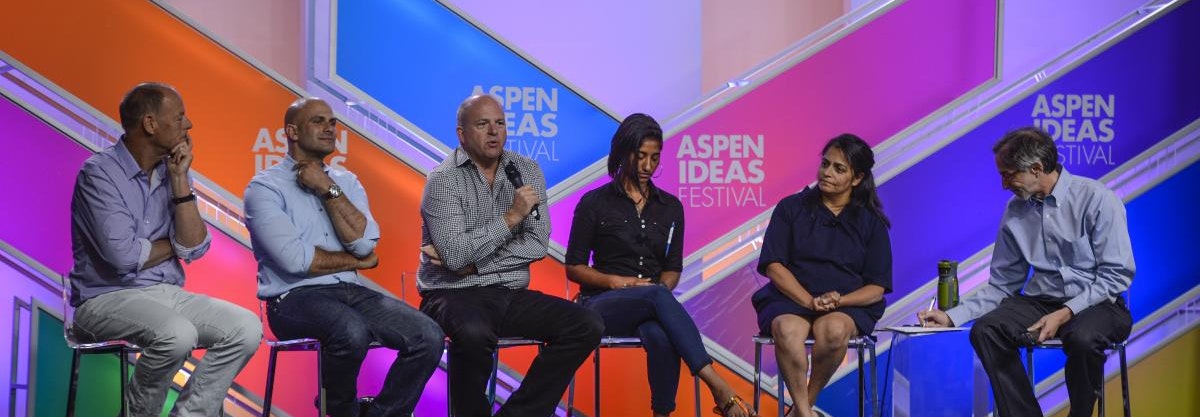
Americans reportedly waste nearly 40 percent of the food we produce. Still, one in six lives with food insecurity, lacking reliable access to food that’s both affordable and nutritious. How does food scarcity coexist with extreme waste in our society? Can we balance this equation?
We asked these questions at the 2016 Aspen Ideas Festival in a Deep Dive session titled Fixing Our Broken Food System. The session explored America’s food system from three vantage points: policymakers, private sector leaders, and sustainability advocates.
The panel included US Representative from Maine Chellie Pingree, co-CEO of Whole Foods Market Walter Robb, President of Campbell Fresh Jeff Dunn, Consumer Reports leader in consumer safety and sustainability Urvashi Rangan, and Director of HEAL Food Alliance Navina Khanna. The experts were joined by senior food analyst for NBC News Sam Kass, and POLITICO reporter Helena Bottemiller Evich. Together, the panelists discussed their latest efforts to fix our broken food system.
Farmers in Washington
When Pingree arrived in Congress in 2008, her colleagues in the House expressed little interest in advocating for the consumer. But public demand for organic products and a push for access to healthy food for low-income neighborhoods have put these issues on the front burner.
A farmer herself, Pingree understood the challenges farmers and consumers were facing. She used her experience to introduce the Local Farms, Food and Jobs Act, which drives economic growth for local farmers and the Food Recovery Act, aimed at reducing food waste.
Private Sector Leaders Go Beyond Making a Profit
Apart from Washington, what can leaders in the private sector do to replenish and sustain our food system?
More and more, big businessmen like Dunn and Robb believe their mission goes beyond making a profit.
“I want to make money by making people healthy by giving them fresh, delicious food,” Dunn explains.
For the leader of Whole Foods Market, a healthier, more nutritious world is embedded in the very framework of the company.
“What’s amazing,” Robb explains, “is that the number of companies that are started by young folks are starting out with the very ideas that you’re going to make a profit and do good for the consumer.”
But that’s not all. Robb and Dunn stress that looking at the individual ingredients of their products isn’t enough. To survive, companies must take into account the systems in which their food is produced.
“Large companies have to figure out that they need to be more trustworthy,” Dunn says. “Trustworthy in the sense that they need to make themselves transparent.”
Dunn and Robb agree that all companies, no matter the size, must become more transparent in order to fix the food system. This transparency proves even more difficult in a time when our climate continues to change rapidly.
Dunn’s business has seen the effects of climate change firsthand. As drought intensified in California this year, Campbell's moved 40 percent of carrot production outside the state.
“We have to recognize that the impact of climate change is going to force a real shift in where we grow and how grow,” Dunn stresses.
A Grassroots Approach
Looking to sustainable advocacy, Urvashi Rangan and Navina Khanna agree that we must broaden our expectations of healthy food to include a healthier food production system. As people become increasingly aware, their focus is on animal welfare, worker welfare, and environment impact.
Khanna argues that, from a sustainability standpoint, our food system is not broken, but instead, doing exactly what it was built to do. History shows that our food system benefits a few and not everyone.
“Fifty million people in the US do not have access to food,” Khanna stresses. “They are food insecure.”
So, how do we fix this? Khanna believes this change needs to come from all angles of the system. HEAL Food Alliance works around this very premise. Started by a small group of anchor organizations, HEAL works to address the challenges communities are facing to affect change from within. For Khanna, political leadership and control over corporate conglomerates in the food industry is essential.
While there is still work to be done, Khanna ends with a simple point: “All we want is for the healthy choice to be the easy choice for everyone.”
By Eliza Costas, Editorial Intern, Aspen Ideas Festival

